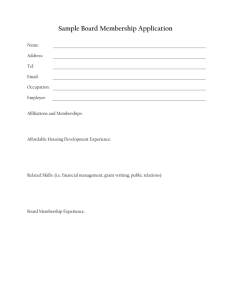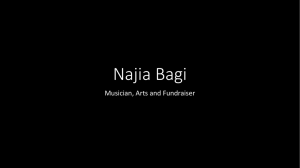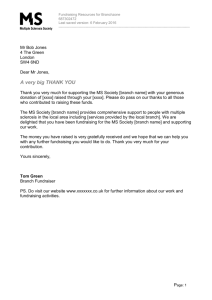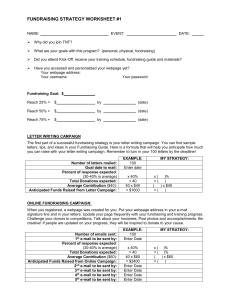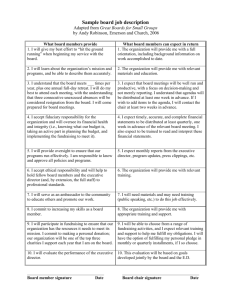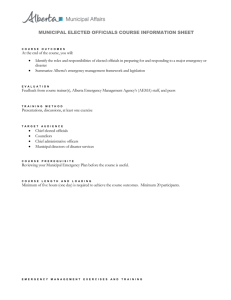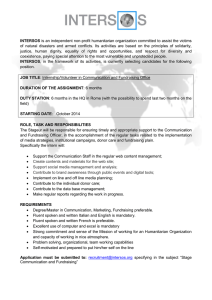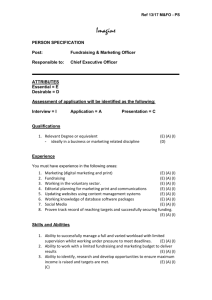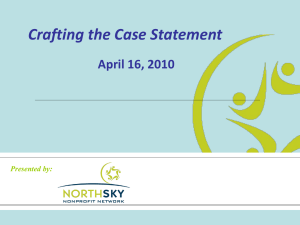Brief Amici Curiae of Senators Bill Bradley and Alan Simpson
advertisement
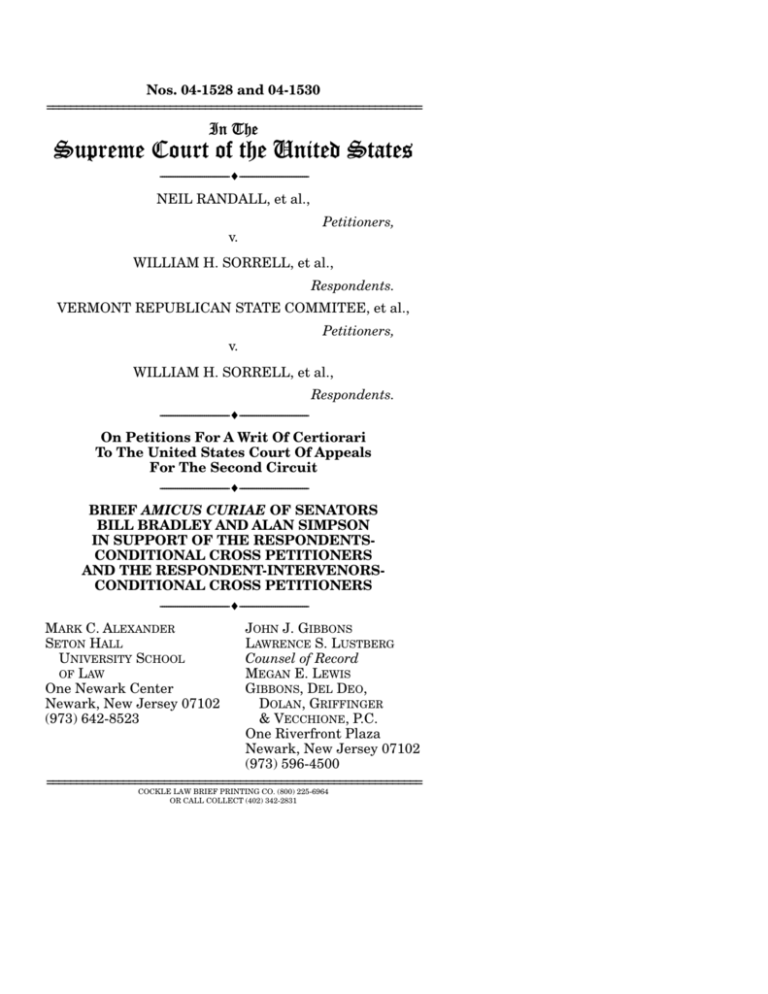
Nos. 04-1528 and 04-1530 ================================================================ In The Supreme Court of the United States ---------------------------------♦--------------------------------NEIL RANDALL, et al., Petitioners, v. WILLIAM H. SORRELL, et al., Respondents. VERMONT REPUBLICAN STATE COMMITEE, et al., Petitioners, v. WILLIAM H. SORRELL, et al., Respondents. ---------------------------------♦--------------------------------On Petitions For A Writ Of Certiorari To The United States Court Of Appeals For The Second Circuit ---------------------------------♦--------------------------------BRIEF AMICUS CURIAE OF SENATORS BILL BRADLEY AND ALAN SIMPSON IN SUPPORT OF THE RESPONDENTSCONDITIONAL CROSS PETITIONERS AND THE RESPONDENT-INTERVENORSCONDITIONAL CROSS PETITIONERS ---------------------------------♦--------------------------------MARK C. ALEXANDER SETON HALL UNIVERSITY SCHOOL OF LAW One Newark Center Newark, New Jersey 07102 (973) 642-8523 JOHN J. GIBBONS LAWRENCE S. LUSTBERG Counsel of Record MEGAN E. LEWIS GIBBONS, DEL DEO, DOLAN, GRIFFINGER & VECCHIONE, P.C. One Riverfront Plaza Newark, New Jersey 07102 (973) 596-4500 ================================================================ COCKLE LAW BRIEF PRINTING CO. (800) 225-6964 OR CALL COLLECT (402) 342-2831 i TABLE OF CONTENTS Page STATEMENT OF INTERESTS OF AMICI CURIAE .. 1 SUMMARY OF THE ARGUMENT ............................... 2 REASONS FOR GRANTING THE WRIT .................... 3 I. II. THE SPIRALING COSTS OF CAMPAIGNS TAKES ELECTED OFFICIALS AWAY FROM THEIR SWORN DUTIES ................................. 3 A. In the Absence of Spending Limits, Campaign Costs in Federal, State and Local Elections Have Escalated........................... 3 B. As a Result of Spiraling Campaign Costs, Elected Officials Spend An Excessive and Ever-Increasing Proportion of Their Time Raising Funds for the Purposes of ReElection and Election to Higher Office......... 5 C. The Time Spent Fundraising Diminishes the Quality of the Representation that Elected Officials Provide, and Undermines the Integrity of the Offices They Hold........ 8 TIME PROTECTION IS A COMPELLING GOVERNMENT INTEREST THAT JUSTIFIES CAMPAIGN EXPENDITURE LIMITS PURSUANT TO BUCKLEY V. VALEO ............. 12 ii TABLE OF CONTENTS – Continued Page A. Because Fundraising Distracts Elected Officials From Their Sworn Duties, Campaign Expenditure Limits Are Vital to Our System of Representative Democracy......... 12 B. Protecting the Integrity of Our System of Representative Democracy is a Compelling Government Interest ................................... 15 C. Albuquerque’s Campaign Limits Directly Serve This Compelling Interest .................. 18 CONCLUSION ............................................................... 20 iii TABLE OF AUTHORITIES Page CASES Am. Party of Tex. v. White, 415 U.S. 767 (1974) ............... 16 Bond v. Floyd, 385 U.S. 116 (1966) ................................... 14 Buckley v. Valeo, 424 U.S. 1 (1976).............................passim Burson v. Freeman, 504 U.S. 191 (1992)........................... 16 Federal Energy Regulatory Comm’n v. Mississippi, 456 U.S. 742 (1982) ........................................................ 19 First Nat’l Bank of Boston v. Bellotti, 435 U.S. 765 (1978) ........................................................................................... 16 Gravel v. United States, 408 U.S. 606 (1972).................... 14 Gray v. Sanders, 372 U.S. 368 (1963)................................ 13 Homans v. City of Albuquerque and Rue v. City of Albuquerque, 366 F.3d 900 (10th Cir. 2004).................. 17 Kruse v. Cincinnati, 142 F.3d 907 (6th Cir.), cert. denied, 525 U.S. 1001 (1998) ......................................... 17 Landell v. Sorell, 2004 WL 1837394 (2004) ................ 17, 18 Lucas v. Forty-Fourth General Assembly of the State of Colorado, 377 U.S. 713 (1964) ................................... 13 McConnell v. Federal Election Commission, 540 U.S. 93, 124 S.Ct. 619 (2003) ......................................... 15 New State Ice Co. v. Liebmann, 285 U.S. 262 (1932)........ 19 Nixon v. Shrink Missouri Gov’t PAC, 528 U.S. 377 (2000) ........................................................................................... 17 Reynolds v. Sims, 377 U.S. 533 (1964) .............................. 13 Storer v. Brow, 415 U.S. 724 (1974) .................................. 16 iv TABLE OF AUTHORITIES – Continued Page Wesberry v. Sanders, 376 U.S. 1 (1964) ............................. 13 WMCA v. Lomenzo, 377 U.S. 633 (1964) ........................... 13 OTHER AUTHORITIES Bob Warner, Critics Tread on Street/Blast Mayoral Hopeful for Remarks on Fund-Raising, Philadelphia Daily News, Sept. 24, 1999, at 15...................................11 Carol Matlack, et al., Money and Politics: a Special Report, 22 Nat’l J. 1448, 1448 (1990) .............................. 7 CENTER FOR RESPONSIVE POLITICS, Alan Simpson; simpsala.pdf, available at http://www.opensecrets. org ..................................................................................... 3 CENTER FOR RESPONSIVE POLITICS, BILL BRADLEY; bradbil.pdf, available at http://www.opensecrets. org ..................................................................................... 3 Dan Clawson, et al., MONEY TALKS: CORPORATE PACS AND POLITICAL INFLUENCE 8, 9 (1992) .................... 6 FEDERAL ELECTION COMMISSION, “Large Fundraising Quarters in Pre-Election Years For Presidential Primary Campaigns” available at http://www. fec.gov (measured from October 1, 1999 through December 31, 1999) .......................................................... 4 Greg Krikorian, California and the West; Campaign Cuts Into Campbell’s Voting Record, Los Angeles Times, July 24, 2000, at A3.............................................. 8 Herbert Alexander, Financing Politics: Money, Elections and Political Reform, at 4, 51 (1992)..........4, 11 James R. Carroll, Senate Rejects Limits on Donations, The Courier-Journal, March 27, 2001, at 1A.................................................................................. 8 v TABLE OF AUTHORITIES – Continued Page Jim Barnett, Fund Raising Is Race Before the Race for re-Election, The Oregonian, Aug. 9, 1999, at A01 .................................................................................... 7 Jim Tankersley, Senate Hopefuls Focus on Money; Campaigns Need Cash to Reach Voters Before the Primaries, Rocky Mountain News, June 11, 2004, at 24A...............................................................................11 John Harwood, For California Senator, Fund Raising Becomes Overwhelming Burden, Wall St. J., Mar. 2, 1994, at A1 ...................................................... 6 Larry Makinson, SPEAKING FREELY 39 (2d ed. 2003) ........ 10 Martin Schram, SPEAKING FREELY 38-43 (1st ed. 1995).................................................................................. 6 Peter Lindstrom, CENTER FOR RESPONSIVE POLITICS, CONGRESS SPEAKS: A SURVEY OF THE 100TH CONGRESS 80 (1998) .................................................... 7, 10 Report of Receipts and Disbursements: Bush-Cheney ’04 Inc., filed 9/20/04......................................................... 5 Report of Receipts and Disbursements: John Kerry for President Inc., filed 9/20/04, available at http://www.fec.gov............................................................. 5 Ronald Michaelson, “Trends in Campaign Financing,” The Book of States, Vol. 35, p. 275 (2003)...................... 19 Schram, SPEAKING FREELY 37-38; JOHN HARWOOD, FOR CALIFORNIA SENATOR, FUND RAISING BECOMES OVERWHELMING BURDEN, WALL ST. J., MAR. 2, 1994, at A8 ..................................................passim Frank J. Sorauf, MONEY IN AMERICAN ELECTIONS 183-84 (1988) .................................................................... 6 THE FEDERALIST NO. 39 (James Madison) ......................... 13 vi TABLE OF AUTHORITIES – Continued Page U.S. PUBLIC INTEREST RESEARCH GROUP, LOOK WHO’S NOT COMING TO WASHINGTON 7 (2003).................. 4 Vincent Blasi, Free Speech and the Widening Gyre of Fund-Raising, 94 COLUM. L. REV. 1281 (1994) .......... 14 CONSTITUTIONAL PROVISIONS U.S. Const. amend. I .................................................... 14, 15 U.S. CONST. Amend. XV ..................................................... 13 U.S. CONST. Amend. XVII .................................................. 13 U.S. CONST. Amend. XIX.................................................... 13 U.S. CONST. Amend. XXIV ................................................. 13 U.S. CONST. Amend. XXVI ................................................. 13 U.S. CONST. art. I ............................................................... 13 U.S. CONST. art. I, § 6......................................................... 14 U.S. CONST. art. IV, § 4....................................................... 13 CONGRESSIONAL RECORD 133 Cong. Rec. S 7782 .........................................................11 133 Cong. Rec. S 7782 (daily ed. Sept. 21, 1997) ................ 5 134 Cong. Rec. S 1053 (daily ed. Feb. 22 1988) .................. 7 137 Cong. Rec. S 5858 (May 15, 1991) ................................ 9 138 Cong. Rec. 115 (daily ed. Jan 6, 1987).......................... 7 142 Cong. Rec. S 377 (daily ed. Jan. 25, 1996) ................. 19 144 Cong. Rec. H 6937, H 6943 (daily ed. Aug. 3, 1998).................................................................................. 9 vii TABLE OF AUTHORITIES – Continued Page 145 Cong. Rec. H 8225, H 8236 (daily ed. Sept. 15, 1999).................................................................................. 9 145 Cong. Rec. S 12575, S 12608 (daily ed. Oct. 14, 1999).................................................................................. 4 147 Cong. Rec. S 2603 (daily ed. Mar. 21, 2001)................. 5 148 Cong. Rec. H 339 (daily ed. Feb. 13, 2002)................... 9 1 STATEMENT OF INTERESTS OF AMICI CURIAE Amici former Senators Bill Bradley and Alan Simpson urge the Court to grant the petition for a writ of certiorari. This case addresses a constitutional question of great magnitude concerning the application of this Court’s First Amendment jurisprudence in the context of campaign finance reform.1 The issue presented herein is whether the State of Vermont’s campaign expenditure limits are justified by a compelling government interest. Bill Bradley is a former United States Senator, and a Democrat from New Jersey. He was first elected to the United States Senate in 1978, and served three full terms, from 1979 to 1997. In addition, Senator Bradley ran for the Democratic Party nomination for President of the United States in the 2000 election cycle. Alan Simpson is a former United States Senator, and a Republican from Wyoming. He was also first elected to the United States Senate in 1978, and served three full terms, from 1979 to 1997. Having served the nation in the United States Senate, amici swore an oath to “support and defend the Constitution of the United States” and to “well and faithfully discharge the[ir] duties.”2 In addition to their service in 1 Counsel for all parties have consented to the filing of this brief, and amici have filed those consents with the Clerk of the Court. No counsel for a party in this case authored this brief in whole or in part, and no person or entity, other than the undersigned amici and their counsel, has made a monetary contribution to this brief ’s preparation and submission. 2 http://www.senate.gov/artandhistory/history/common/briefing/Oath _Office.htm. 2 the Senate, amici have raised millions of dollars for their campaigns, for their respective parties, and for other candidates. Amici are proud of their service in the legislative branch; however, as former members of a coordinate branch, they feel compelled to advise the Court of their utmost concern for the problem presented. With a sense of continuing obligation to serve to the nation, amici file this brief in support of the Respondents-Conditional Cross Petitioners and the Respondent-Intervenors-Conditional Cross Petitioners. ---------------------------------♦--------------------------------SUMMARY OF THE ARGUMENT This case raises the question whether the immense time commitment of fundraising detracts excessively from the effective performance of duty by elected officials. Amici posit that due to the demands of fundraising, it is difficult for elected officials to fulfill their duties, and that the Constitution therefore permits government to place limits on campaign expenditures. For this reason, the Court should grant this petition for certiorari to address the constitutionality of the State of Vermont’s campaign expenditure limits. The instant case provides the Court with an opportunity to consider issues central to the integrity of our system of representative democracy, as States and localities across the nation seek to address the impact of fundraising on campaigns and on officials’ performance in elected office. The petition for a writ of certiorari should be granted because there is a compelling government interest in protecting the time of elected officials from the excessive demands of fundraising. Without limits on campaign expenditures, campaign costs have escalated and fundrais- 3 ing has become an inordinately time-consuming job for candidates and office holders fearful of being out-matched by their opponents’ spending. As a result, the ability of elected officials to perform their duties has diminished, the quality of representation has declined, and the integrity of elected office has been undermined. Preserving the time of elected officials from the burdens of constant fundraising presents a compelling interest supporting campaign expenditure limits, an interest which was not before the Court in Buckley v. Valeo, 424 U.S. 1 (1976). ---------------------------------♦--------------------------------REASONS FOR GRANTING THE WRIT I. THE SPIRALING COSTS OF CAMPAIGNS TAKES ELECTED OFFICIALS AWAY FROM THEIR SWORN DUTIES. A. In the Absence of Spending Limits, Campaign Costs in Federal, State and Local Elections Have Escalated. In the 28 years since the Court decided Buckley v. Valeo, the costs of running a successful campaign for local, state or national office have rapidly escalated. In 1978, Amicus Senator Bradley spent $1,688,499 in his campaign for a United States Senate seat in New Jersey. CENTER FOR RESPONSIVE POLITICS, BILL BRADLEY; bradbil.pdf, available at http://www.opensecrets.org. In 1990, a mere twelve years later, Amicus Senator Bradley spent nearly $12.5 million in his reelection bid, raising approximately forty thousand dollars per week, every week for six years. Likewise, in the 1990 senatorial race in Wyoming, Amicus Simpson spent $1,443,298 to win re-election, 3.3 times the amount spent in 1978. CENTER FOR RESPONSIVE POLITICS, ALAN SIMPSON; simpsala.pdf, available at http://www.opensecrets.org. 4 Overall Congressional candidate fundraising increased 425 percent between 1978 and 2000, compared to 170 percent inflation during the same period. U.S. PUBLIC INTEREST RESEARCH GROUP, LOOK WHO’S NOT COMING TO WASHINGTON 7 (2003). From 1986 to 2000, the average cost of a successful campaign for the United States House of Representatives rose from $359,577 to $848,296. Id. Adjusted for inflation, this amounts to a 151 percent increase. Similarly, the average victorious Senate campaign in 1986 cost $3,067,559 compared to $7,389,176 in 2000 – a 154 percent increase, adjusted for inflation. Id.3 In the realm of presidential politics, spending has escalated at an even more alarming rate. In his bid for the Democratic Presidential Nomination in 2000 Senator Bradley, although no longer a member of the Senate, raised $8,607,781 in campaign contributions in his most successful fundraising quarter. FEDERAL ELECTION COMMISSION, “Large Fundraising Quarters in Pre-Election Years For Presidential Primary Campaigns,” available at http://www.fec.gov (measured from October 1, 1999 through December 31, 1999). Sitting Vice President Al Gore, the eventual Democratic Party nominee for President, had his largest fundraising quarter in the first quarter of 1999 during which time he raised $8,881,976. Id. (measured from January 1, 1999 through March 31, 3 The following breakdown is particular noteworthy. In 1992, the average Senator had to raise nearly $13,000 each week for the entire six-years term in order to amass the amount that a winning Senate race would cost. Herbert Alexander, FINANCING POLITICS: MONEY, ELECTIONS, AND POLITICAL REFORM 54 (1992). By 2001, Senator Barbara Boxer estimated that for a successful Senate campaign in California, a candidate would need to raise $10,000 per day. 145 Cong. Rec. S 12575, S 12608 (daily ed. Oct. 14, 1999) (statement of Senator Barbara Boxer). 5 1999). Seeking the Republican Party’s nomination in 2000, then-Governor George W. Bush dwarfed all previous fundraising quarters in history when, in the second quarter of 1999, he raised $29,484,602 in ninety-one days while serving as the Governor of Texas. Id. Yet the 2000 election cycle pales in comparison to the 2004 presidential election, which shattered all previous fundraising records. Both major party nominees opted out of the public financing system for their respective party’s primary campaigns and raised a combined total of $496.6 million in contributions from individuals. Report of Receipts and Disbursements: Bush-Cheney ’04 Inc., filed 9/20/04, available at http://www.fec.gov; Report of Receipts and Disbursements: John Kerry for President Inc., filed 9/20/04, available at http://www.fec.gov. To achieve these record sums, the two candidates combined had to raise at least one million dollars per day for well over a year. B. As a Result of Spiraling Campaign Costs, Elected Officials Spend An Excessive and Ever-Increasing Proportion of Their Time Raising Funds for the Purposes of Reelection and Election to Higher Office. As a result of spiraling campaign costs, elected officials spend an excessive and ever-increasing proportion of their time raising funds for the purposes of re-election and election to higher office.4 Senators and Members of Congress 4 See, e.g., 147 Cong. Rec. S 2603 (daily ed. Mar. 21, 2001) (statement of Senator Richard Durbin) (“The whole process has been tainted . . . by the fact that so many candidates, myself included, spend so many waking hours trying to raise money to launch an effective campaign.”); 133 Cong. Rec. S 7782 (daily ed. Sept. 21, 1997) (statement (Continued on following page) 6 spend many hours each week – and sometimes each day – raising money, “dialing for dollars,”5 and attending fundraisers for themselves and for others.6 As Senator Dennis DeConcini said, “The worst thing about it is that members have to spend so much time in the pursuit of campaign finances that I think their ability to do really their best as legislators is jeopardized . . . When I was running, I was spending about two hours a day on the phone raising money. Minimum. Six days a week. That takes away from your ability to represent your constituents, or to do your legislative work, or what have you.” Martin Schram, SPEAKING FREELY 38. Elected officials also travel frequently in order to raise money, not only within their own states, but also to other states with high concentrations of wealthy donors.7 of Senator Harry Reid) (stating that when he ran for the Senate while he was a member of the House of Representatives, he spent the “vast majority” of his time raising money); Martin Schram, SPEAKING FREELY 38-43 (1st ed. 1995) (setting forth interviews with current and former Republican and Democratic Senators and Representatives in which the elected officials agreed that escalating campaign costs forced them to spend too much time raising money); Dan Clawson, et al., MONEY TALKS: CORPORATE PACS AND POLITICAL INFLUENCE 203-04 (1992); Frank J. Sorauf, MONEY IN AMERICAN ELECTIONS 183-84 (1988). 5 See John Harwood, For California Senator, Fund Raising Becomes Overwhelming Burden, Wall St. J., Mar. 2, 1994, at A1 (quoting Senator Diane Feinstein: “My people want me . . . to be on the phone all the time.”). 6 See Schram, SPEAKING FREELY 38 (“The time that you spend raising money, and the number of fund-raising events I was obliged to attend or at least stop by – gosh, you’d have five or six a night. It just wears you out doing that,” Statement of House Minority Leader Robert Michel; and “[Fundraisers] three evenings per week, plus 10 to 12 hours in your own races,” Statement of Representative Dave Durenberger). 7 For example, in 1986 then-Representative Thomas A. Daschle of South Dakota flew to California more than twenty times, visiting Los (Continued on following page) 7 Moreover, in order to meet the inordinate demands of a successful fundraising campaign, elected officials begin campaigning for their next race the day they take office. This frenetic fundraising pace continues throughout their terms. “As soon as a Senator is elected here,” said Senator Tom Harkin, “that Senator better start raising money for the next election 6 years down the pike.” 134 Cong. Rec. S 1053 (daily ed. Feb. 22, 1988). Senator Robert Byrd, former Majority Leader, similarly observed: “To raise the money, Senators start hosting fundraisers years before they next will be in an election. They all too often become fundraisers first, and legislators second.” 138 Cong. Rec. 115 (daily ed. Jan. 6, 1987).8 As one Republican Congressman said: “[Fundraising] devours one’s time – you spend two or three years before your re-election fundraising. The other years, you’re helping others.” See Peter Lindstrom, CENTER FOR RESPONSIVE POLITICS, CONGRESS SPEAKS: A SURVEY OF THE 100TH CONGRESS 80 (1988) (quoting unnamed Republican Congressman). In sum, the current system relentlessly pressures office holders to spend a vast amount of their time fundraising. Angeles almost as much as he did Sioux Falls, in order to raise money for media buys in his Senate race. See Carol Matlack et al., Money and Politics: A Special Report, 22 Nat’l J. 1448, 1448 (1990); Peter Lindstrom, CENTER FOR RESPONSIVE POLITICS, CONGRESS SPEAKS: A SURVEY OF THE 100TH CONGRESS 80 (1998) (noting that in 1992, 28% of all individual contributions above $200 collected by candidates for federal office came from donors who live outside their states.); Schram, SPEAKING FREELY 42 (“The money demands are so great, we have to go out of state . . . That’s the killer,” Statement of Representative Wyche Fowler). 8 See also Jim Barnett, Fund Raising Is Race Before the Race for re-Election, The Oregonian, Aug. 9, 1999, at A01 (describing the intensive fundraising efforts in a Congressional race more than a year prior to election). 8 C. The Time Spent Fundraising Diminishes the Quality of the Representation that Elected Officials Provide, and Undermines the Integrity of the Offices They Hold. The time spent fundraising interferes with the ability of elected officials to carry out the duties for which they were elected. “We have been transformed from a body of lawmakers into a body of full-time fundraisers.” See James R. Carroll, Senate Rejects Limits on Donations, The Courier-Journal, March 27, 2001, at 1A (quoting Senator Ernest Hollings). Legislators no longer spend enough time on legislation, constituent services, committee work, oversight responsibilities, and debating or negotiating with fellow representatives. Rather, many legislators neglect these duties in favor of raising money. Representatives and Senators routinely miss important votes due to conflicts with their fundraising activities.9 Legislators often feel that they do not have the time to meet with or directly represent their constituents. As Representative 9 Former Senate Majority Leader George Mitchell explained that Senators constantly wanted him to reschedule debates because “they [were] either holding or attending a fund-raising event that evening.” Senator Mitchell noted that, “[i]f I put all the requests together, the Senate would never vote.” Schram, SPEAKING FREELY 37-38; John Harwood, For California Senator, Fund Raising Becomes Overwhelming Burden, Wall St. J., Mar. 2, 1994, at A8 (noting that Senator George Mitchell “is often pestered by colleagues who don’t want floor votes to conflict with fundraisers, and sometimes obliges them.”); see also Greg Krikorian, California and the West; Campaign Cuts Into Campbell’s Voting Record, Los Angeles Times, July 24, 2000, at A3 (detailing Representative’s abysmal attendance record in Congress while campaigning for United States Senate: “[Representative] Campbell says he has no choice but to miss votes in a system that demands huge amount of campaign money – a system he wants to change. And his opponent [Senator Diane Feinstein] is a well known, well financed incumbent.”). 9 Christopher Shays lamented: “[Elected officials] spend far too much time fund-raising and not enough time listening to their constituents and doing their jobs.” 148 Cong. Rec. H 339 (daily ed. Feb. 13, 2002). Former Representative Bob Edgar commented that during an election “eighty percent of my time, 80 percent of my staff ’s time, 80 percent of my events and meetings were fundraisers. Rather than go to a senior center, I would go to a party where I could raise $3,000 or $4,000.” Schram, SPEAKING FREELY 40. The primary focus of elected officials has shifted from serving their constituents to preserving their jobs by raising money. Elected officials recognize that the excessive demands of fundraising have caused the overall quality of the representation they provide to decline. In Congressional floor debates concerning campaign finance reform legislation, Republicans and Democrats consistently and repeatedly describe the negative impact that the time devoted to fundraising has on the quality and substance of their representation.10 Representative Vin Weber stated that: 10 See, e.g., 145 Cong. Rec. H 8225, H 8236 (daily ed. Sept. 15, 1999) (statement of Representative Thomas Udall) (“More and more time is being spent raising money, and this translates into less time being spent doing our duties to support the public and represent our citizens . . . The high cost of campaigns is unfairly restricting dedicated, qualified people from running for public office, and is putting elected officials in a position of having to choose between spending their time doing their jobs or raising money.”); 144 Cong. Rec. H 6937, H 6943 (daily ed. Aug. 3, 1998) (statement of Representative Marge Roukema) (“Our campaign finance system is out of control. Costs are skyrocketing. Candidates of all kinds are finding themselves devoting more time and energy to fundraising – at the expense of their public service duties.”); 137 Cong. Rec. S 5858 (May 15, 1991) (statement of Senator David Boren) “When we think of the time it takes away from doing the duties we are elected to perform, we know something is wrong. When we think about the fact that Members of Congress are becoming part-time public officials, part-time policymakers.” 10 “when the members making decisions can’t devote serious quality time to serious decisions, it has to [result in] a lower quality of work.” Schram, SPEAKING FREELY 41. Elected officials increasingly feel that they are forced to choose between attending to their sworn duties and raising money for the purposes of re-election or election to a higher office.11 One Congressman stated that the time spent fundraising for his Senate race “crippled” his ability to fulfill his Congressional duties. Schram, SPEAKING FREELY 40.12 Not only has the quality of representation declined due to the absence of expenditure limits, but so too has the quality of campaigns for elected office. The vast majority of a candidate’s time is spent fundraising, as opposed to 11 In a survey of House and Senate members and their staffs, the Center for Responsive Politics found that 52 percent of the senators surveyed thought the demands of fundraising cut significantly into the time available for legislative work. Another 12 percent believed fundraising had some deleterious effect. See Peter Lindstrom, Center for Responsive Politics, CONGRESS SPEAKS – A SURVEY OF THE 100TH CONGRESS (Washington, 1998); see also Larry Makinson, SPEAKING FREELY 39 (2d ed. 2003) (“[T]he dialing for dollars is to get somebody elected. The protecting the dollars [of their constituents] is one of the primary legislative responsibilities. And too often, one comes at the expense of the other,” Statement of Representative Tom Roemer); Schram, SPEAKING FREELY 38, 42-43 (“I needed to constantly raise money. A very real distraction from the real business of legislating,” Statement of Representative Leslie Byrne; and “[Y]ou’d like to be spending your time on legislation – on the floor of the Senate, in committees, with staff, deciding what other projects you want to be involved in. But the end-all and be-all is to have sufficient money to run your campaign. So that which you should be doing doesn’t always get the first priority. It becomes very timeconsuming, very arduous,” Statement of Senator Howard Metzenbaum). 12 Representative Jim Bacchus explained that he chose not to run for re-election because he would have had to abandon the job he had “been elected to do in order to raise a million dollars and be a virtual full time candidate.” Schram, SPEAKING FREELY 43. 11 engaging with constituents, opponents or even ideas.13 Because they are consumed with fundraising, candidates do not have time during their campaigns to engage the issues or the voters.14 The excessive demands of fundraising undermine the integrity of the offices that elected officials hold. Senator Robert Byrd complained that the preoccupation with fundraising so interfered with legislating, that it posed “institutional concern about the integrity of the U.S. Senate.” Herbert E. Alexander, FINANCING POLITICS: MONEY, ELECTIONS AND POLITICAL REFORM, at 4, 51 (1992). Former Senator Dennis De Concini said: “I felt like I was cheating, that I was not putting in a full day’s work for what I was really elected to do. I was not elected to come back here and 13 See Bob Warner, Critics Tread on Street/Blast Mayoral Hopeful for Remarks on Fund-Raising, Philadelphia Daily News, Sept. 24, 1999, at 15 (quoting mayoral candidate as saying that the continued escalation of fundraising has “changed the whole tenor of political campaigns,” and that if the incumbent “had less money to spend on 30second campaign ads, he would be more willing to engage in debates and other joint appearances, giving voters more chances to evaluate the mayoral candidates face to face.”). 14 See, e.g., 133 Cong. Rec. S 7782 (Statement of Senator Fritz Hollings (“In my 1986 reelection campaign, I hardly had time to genuinely stop, look, and listen to the people I was going to represent.”); Schram, SPEAKING FREELY, at 40 (“I did raise a lot of money, particularly in my Senate race, and it just drained my time and ability to do anything else. It just crippled my ability to do my job properly in my final term, or to run an effective campaign beyond the fundraising part of it,” and “That’s just the way it is in politics in general. Other than a few debates and shaking hands, the rest of your time is raising money,” Statements of Representative Mel Levine); Jim Tankersley, Senate Hopefuls Focus on Money; Campaigns Need Cash to Reach Voters Before the Primaries, Rocky Mountain News, June 11, 2004, at 24A (describing statements by former Representative Robert Schaffer that he was spending “120 percent” of his time fundraising in the Republican primary for Senate). 12 raise money for my next election. And that always has bothered me from the standpoint of what I think the people elected me to do.” Schram, SPEAKING FREELY 40.15 The current presidential election cycle provides a compelling example of the negative effects of unlimited spending. The two major party nominees, both current officeholders, decided to forego the public financing available in the primaries.16 Instead, President Bush and Senator Kerry raised money at a pace of at least one million dollars per day, every day, while also serving as federal officeholders. The number of hours they spent raising these vast sums is time lost to the American people. Amici submit that their time, and that of all elected officials, is a compelling interest worth protecting. II. TIME PROTECTION IS A COMPELLING GOVERNMENT INTEREST THAT JUSTIFIES CAMPAIGN EXPENDITURE LIMITS PURSUANT TO BUCKLEY V. VALEO. A. Because Fundraising Distracts Elected Officials From Their Sworn Duties, Campaign Expenditure Limits Are Vital to Our System of Representative Democracy. As discussed above, fundraising takes elected officials away from their core duties. This in turn undermines our system of representative democracy. Campaign expenditure 15 See also Schram, SPEAKING FREELY 40 (“[P]eople would be genuinely unhappy about how much time members have to spend on fund-raising. Portions of every day are spent dialing for dollars,” statement of Rep. Dennis Eckhart). 16 President Bush raised massive sums even though he had no primary opponent. 13 limits thus serve the vital interest of protecting our system from the demands that fundraising places on the time of our elected officials. The American Republic is founded on the notion of elected representatives serving the people. As James Madison wrote in Federalist 39, “we may define a republic to be, or at least may bestow that name on, a government which derives all its powers directly or indirectly from the great body of the people, and is administered by persons holding their offices during pleasure for a limited period, or during good behavior.” THE FEDERALIST NO. 39 (James Madison). The Framers put these assurances of representative government in the Constitution itself. See U.S. CONST. art. I; U.S. CONST. Amend. XVII; U.S. CONST. art. IV, § 4 (“The United States shall guarantee to every State in this Union a Republican Form of Government.”). The Constitution also carefully enshrines the mechanism of democracy, emphasizing the fundamental importance of representative democracy to our system of government.17 This Court’s jurisprudence has likewise stressed the importance of protecting the mechanisms and principles of representative democracy. See, e.g., Gray v. Sanders, 372 U.S. 368 (1963); Wesberry v. Sanders, 376 U.S. 1 (1964); Reynolds v. Sims, 377 U.S. 533 (1964); WMCA v. Lomenzo, 377 U.S. 633 (1964); Lucas v. Forty-Fourth General Assembly of the State of Colorado, 377 U.S. 713 (1964). Moreover, the Constitution also directly protects the core functions of legislators. Thus, the Constitution’s 17 See U.S. CONST. Amend. XV (protecting the vote for emancipated slaves), U.S. CONST. Amend. XIX (protecting the vote for women), U.S. CONST. Amend. XXIV (abolishing the poll tax), U.S. CONST. Amend. XXVI (extending right to vote to eighteen-year-olds). 14 Speech or Debate Clause protects the right of legislators to be free from interference with their core functions: debating, voting, and actions taken in pursuit of these lawful functions. U.S. CONST. art. I, § 6, cl. 1; see also Gravel v. United States, 408 U.S. 606, 616 (1972) (holding that the Speech or Debate Clause is designed to assure the Congress “wide freedom of speech, debate and deliberation,”); Bond v. Floyd, 385 U.S. 116, 136-37 (1966) (holding in a First Amendment case that the right of constituents to be “represented in governmental debates by the person they had elected to represent them” is an interest of the highest magnitude). As set forth above, every hour spent by an elected official making fundraising calls is an hour lost to these representative and legislative functions. These hours represent time that could be spent communicating with constituents, studying legislation, or otherwise fulfilling core legislative functions as enshrined in the Constitution. As Professor Vince Blasi has argued, “Legislators and aspirants for legislative office who devote themselves to raising money round-the-clock are not in essence representatives.” Vincent Blasi, Free Speech and the Widening Gyre of Fund-Raising, 94 COLUM. L. REV. 1281, 1283 (1994). When devoting their time to fundraising, legislators are not engaging in the core functions of speech or debate: voting, deliberating, and debating or negotiating with fellow representatives. In sum, the time that candidates and office holders spend fundraising takes them away from duties that constitute the core of our system of representative democracy. Because elected representatives are at the heart of the American republic, the government has a compelling interest in protecting their time in service of the people. 15 B. Protecting the Integrity of Our System of Representative Democracy is a Compelling Government Interest. Enabling candidates and office holders to spend less time fundraising and more time performing their duties as representatives and interacting with voters is a compelling government interest pursuant to Buckley v. Valeo. In Buckley this Court held that laws that restrict campaign contributions or expenditures must meet exacting scrutiny.18 The Court held that the portion of the Federal Elections Campaign Act which limited campaign expenditures was not supported by a compelling government interest and hence violated the First Amendment. By contrast, the Court found that individual campaign contributions survived strict scrutiny on the grounds that: “[t]o the extent that large contributions are given to secure a political quid pro quo from current and potential office holders, the integrity of our system of representative democracy is undermined.” Buckley, 424 U.S. at 26-27 (emphasis added). The need to protect our system of representative democracy from the appearance or reality of corruption thus provided a compelling government interest for regulating political speech. See also McConnell v. Federal Election Commission, 540 U.S. 93, ___, 124 S.Ct. 619, 66061 (2003) (extending this rationale to justify limits on soft money contributions). This is precisely the interest served by protecting the time of legislators in the service of their 18 Amici suggest that the Court may also consider whether strict scrutiny is required when reviewing campaign finance reform measures, or whether a lesser level of scrutiny would suffice. Irrespective of the level of scrutiny, amici submit that there is at least a compelling government interest. 16 core legislative functions. Just as our system of representative democracy is undermined by corruption or the appearance of corruption, so too is our system of representative democracy undermined when legislators tend to fundraising at the expense of their core legislative functions. Similarly, the Court has repeatedly held that protecting the integrity of the electoral process is a compelling government interest. For example, in First Nat’l Bank of Boston v. Bellotti, 435 U.S. 765, 788-89 (1978), the Court held, “Preserving the integrity of the electoral process . . . and ‘sustaining the active, alert responsibility of the individual citizen in a democracy for the wise conduct of government’ are interests of the highest importance.” See also Burson v. Freeman, 504 U.S. 191 (1992) (compelling interest in preventing voter intimidation and election fraud); Am. Party of Tex. v. White, 415 U.S. 767, 782 n. 14 (1974) (preservation of the integrity of the electoral process and avoiding voter confusion is compelling); Storer v. Brow, 415 U.S. 724, 736 (1974) (state may act to protect compelling “interest in the stability of its political system”). As set forth above, the inordinate demands of fundraising have undermined the quality of campaigns and the electoral process in the same manner that they have undermined the quality of representation. Fundraising takes the place of debating the issues and meeting with constituents. Buckley and the Court’s jurisprudence allow that a compelling government interest could be presented that would justify campaign expenditure limits in light of the interest in preserving the integrity of our system of representative democracy. Justice Kennedy noted that such an interest could be demonstrated in light of the post-Buckley 17 spending frenzy: “For now, however, I would leave open the possibility that Congress, or a state legislature, might devise a system in which there are some limits on both expenditures and contributions, thus permitting office holders to concentrate their time and efforts on official duties rather than on fundraising.” Nixon v. Shrink Missouri Gov’t PAC, 528 U.S. 377, 409 (2000) (Kennedy, J., dissenting).19 Similarly, Justice Breyer, in an opinion joined by Justice Ginsburg, argued that, particularly in light of post-Buckley developments, legislatures could find compelling reasons to enact campaign finance reform laws, so as to “protect the integrity of the electoral process.” Id. at 403-04 (Breyer, J., concurring). 19 As petitioners have suggested, there is significant disagreement in the lower courts on this matter that the Supreme Court can resolve. Several appeals courts and judges have opined that time protection is a compelling government interest. In the instant matter, the Second Circuit observed that, “after Buckley, there remains the possibility that a legislature could identify a sufficiently strong interest, and develop a supporting record, such that some expenditure limits could survive constitutional review.” Landell v. Sorrell, 382 F.3d 91, 108 (2d Cir. 2004). The Second Circuit has affirmed the time protection rationale as being a compelling government interest. A concurrence in the Sixth Circuit offers a similar perspective: “It may be possible to develop a factual record to establish that the interest in freeing officeholders from the pressures of fundraising so they can perform their duties, or the interest in preserving faith in our democracy, is compelling, and that campaign expenditure limits are a narrowly tailored means of serving such an interest.” Kruse v. Cincinnati, 142 F.3d 907, 920 (6th Cir.), cert. denied, 525 U.S. 1001 (1998) (Cohn, D.J., concurring). In a recent case from the Tenth Circuit, Judge Lucero wrote that Buckley did not address the time protection rationale that is being urged here. Homans v. City of Albuquerque and Rue v. City of Albuquerque, 366 F.3d 900, 911 (10th Cir. 2004), cert. denied, 125 U.S. 625 (2004). But majorities in these two cases from the Sixth and Tenth Circuits ultimately disagree with the Second Circuit opinion in the instant matter. The Court should grant this petition in order to provide clear guidance and resolve this split among the circuits. 18 C. Vermont’s Campaign Limits Directly Serve This Compelling Interest. The record in the case demonstrates that Vermont’s campaign expenditure limits serve the compelling government interest of protecting the integrity of our system of representative democracy. In enacting the law in question, the Vermont General Assembly specifically found that the demands of fundraising take excessive time away from the people’s business. 1997 Vt. Laws P.A. 64 (H.28) (finding No. 1). After a full trial, the District Court in this case agreed, finding that “the need to solicit money from large donors at times turns legislators away from their official duties.” Landell v. Sorrell, 118 F. Supp. 2d 459, 468 (D. Vt. 2000). This was confirmed by the Second Circuit: “Simply put, every hour spent drumming up financial contributions is an hour that cannot be spent independently studying legislative proposals or meeting with constituents who may not be likely donors.” Landell v. Sorrell, 382 F.3d 91, 121-22 (2d Cir. 2004). The State of Vermont has enacted sensible limits on campaign expenditures, protecting the time of elected officials and, consequently, “the integrity of our system of representative democracy.” Buckley, 424 U.S. at 26-27.20 20 One author has observed, It is clear that states have been activists in the area of campaign finance regulation. And while some common approaches and trends can be identified, it is also apparent that the varying political cultures in each state give rise to different solutions. What is deemed a problem in one state is often disregarded in another. . . . [E]ach state is its own laboratory for reform. (Continued on following page) 19 These limits are similar to the myriad efforts that other States and localities have taken to enact meaningful campaign reform, efforts that amici have long admired.21 To the extent that the States are laboratories of democracy,22 amici submit that this Court should clarify that experimentation like that undertaken by the State of Vermont is not per se banned by Buckley. The limits adopted by the State of Vermont are supported by a compelling government interest. As in Vermont, without spending limits elected officials at all levels spend excessive amounts of time fundraising. The time spent fundraising undermines both the performance of their core functions – debating, voting, negotiating, and meeting with constituents – and the quality of campaigns. Protecting the integrity of elected office and of our system of representative democracy, both in the performance of elected officials and in the conduct of campaigns, is an interest of the highest order, enshrined in both the Constitution and this Court’s jurisprudence. As such, protecting the time of elected officials from the excessive demands of Ronald Michaelson, “Trends in Campaign Financing,” The Book of States, Vol. 35, p. 275 (2003). 21 See, e.g., 142 Cong. Rec. S 377 (daily ed. Jan. 25, 1996) (Statement of Senator Bill Bradley) (“I consider those State activists my partners in this reform proposal, and I believe they deserve to have a proposal on the table in Washington that is as radical, as serious, and as real as what people are talking about in the States.”). 22 “Courts and commentators frequently have recognized that the 50 States serve as laboratories for the development of new social, economic, and political ideas. This state innovation is no judicial myth.” Federal Energy Regulatory Comm’n v. Mississippi, 456 U.S. 742, 788 (1982) (O’Connor, J., concurring in the judgment in part and dissenting in part) (citations omitted); see also New State Ice Co. v. Liebmann, 285 U.S. 262, 311 (1932) (Brandeis, J., dissenting). 20 fundraising provides a compelling government interest which supports campaign expenditure limits. Accordingly, the Court should grant this petition for certiorari in order to resolve this important federal question, in light of conflicting lower court decisions, and to permit cities and states to continue to enact such reform in the service of our core democratic principles. ---------------------------------♦--------------------------------CONCLUSION For the foregoing reasons, the petition should be granted. Respectfully submitted, MARK C. ALEXANDER SETON HALL UNIVERSITY SCHOOL OF LAW One Newark Center Newark, New Jersey 07102 (973) 642-8523 JOHN J. GIBBONS LAWRENCE S. LUSTBERG MEGAN E. LEWIS GIBBONS, DEL DEO, DOLAN, GRIFFINGER & VECCHIONE, P.C. One Riverfront Plaza Newark, New Jersey 07102 (973) 596-4500
